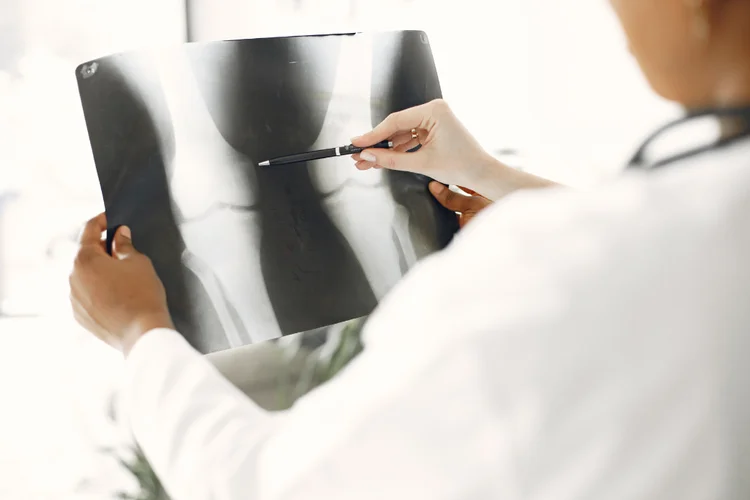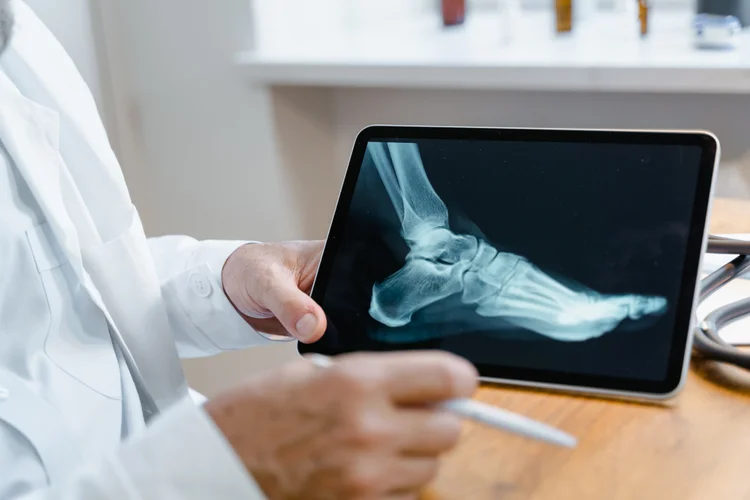Bone Specialist | Bone & Joint Specialist Clinic
Information reviewed by: Dr. Foo Gen Lin | Last updated: Oct 29, 2025
Dealing with a fracture, stress injury, or bone-related pain? Dr Foo provides comprehensive assessment and evidence-based treatment to support healing and long-term function.
MBBS (University of London) | MMed (Ortho) | FRCSEd (Ortho) | FAMS (Ortho)



What Does a Bone Specialist Do?
A bone specialist, also known as an orthopaedic doctor, diagnoses, treats, and
manages conditions affecting the bones, joints, and musculoskeletal system.
This includes acute injuries, chronic conditions, and age-related degeneration, helping to
restore mobility, relieve pain, and support long-term musculoskeletal health.
Common Bone Conditions Treated
1. Acute (Traumatic) Bone Injuries
- Fractures – Breaks in bones caused by trauma, excessive force, or repetitive stress, with varying severity from hairline cracks (stress fractures) to compound or comminuted fractures.
- Dislocations – Bones forced out of their normal joint position, usually due to sudden impact, joint instability, or abnormal twisting.
- Bone Bruises – Microscopic damage to bone tissue caused by blunt trauma, sudden impact, or excessive pressure.
- Avulsion Fractures – Occur when a fragment of bone is pulled away by a tendon or ligament due to sudden forceful movements, such as rapid acceleration, abrupt direction changes, or overexertion.
2. Bone Stress and Overuse Injuries

- Stress (Hairline) Fractures – Small cracks in bones caused by repeated impact or excessive mechanical loading, particularly in weight-bearing bones like the tibia and metatarsals.
- Shin Splints – Pain along the shinbone caused by repetitive impact from running, jumping, or excessive training without proper recovery.
- Subchondral Bone Edema – Bone marrow swelling caused by chronic joint overload, repetitive stress, or inflammatory conditions.
3. Chronic Degenerative Bone Conditions
- Osteoarthritis – A degenerative joint condition where cartilage gradually wears away, often as a result of age-related joint wear, previous injuries, or mechanical stress. It commonly affects weight-bearing joints such as the knees, hips, shoulder, and spine, but can also occur in the hands and other joints.
- Osteoporosis – A condition where bones lose density, becoming brittle and more prone to fractures, particularly in the hips and wrists.
- Spinal Osteoarthritis (Degenerative Disc Disease) – Degeneration of the cartilage between spinal vertebrae, resulting in bony overgrowths (osteophytes) and spinal joint pain.
- Paget’s Disease of Bone – A disorder that disrupts the normal bone remodelling process, causing bones to become enlarged, weakened, and structurally abnormal.
4. Bone Infections and Inflammatory Conditions

- Osteomyelitis – A bacterial or fungal infection that inflames bone tissue, often caused by open fractures, post-surgical infections, or bloodstream infections.
- Septic Arthritis (Infectious Arthritis) – A bacterial infection that directly affects bone-associated joints, typically resulting from joint surgery, penetrating injuries, or systemic infections. It often requires urgent medical intervention to prevent joint damage.
- Brodie's Abscess (Subacute Osteomyelitis) – A localised collection of pus within bone, usually caused by a low-grade bacterial infection, commonly from Staphylococcus aureus. If left untreated, it can progress to chronic osteomyelitis.

How Does a Bone Specialist Diagnose Bone Conditions?
At Apex Sports Clinic, we believe a thorough diagnostic process comprising clinical assessments, imaging, and specialised tests helps identify the root cause of bone pain or dysfunction.
1. Clinical Evaluation
- Medical History Review – Evaluating symptoms, past injuries, medical conditions, medications, and any family history of bone or joint disorders.
- Physical Examination – Assessing the affected area for pain, swelling, tenderness, joint stability, mobility, and any functional limitations.
2. Imaging Tests
- X-ray – Identifies fractures, joint misalignments, and bone deformities.
- Magnetic Resonance Imaging (MRI) – Provides detailed images of soft tissues, bones, and cartilage.
- Computed Tomography (CT) Scan – Generates cross-sectional images for a more comprehensive view of bone structures.
- Ultrasound – Evaluates bone mineral density to assess osteoporosis risk.
3. Specialised Tests
- Blood Tests – Checks for infections, inflammation markers, or metabolic bone disorders.
- Joint Aspiration – Analyses joint fluid to detect infections, inflammation, or crystals from conditions like gout.
What Treatment Options Are Available for Bone Conditions?
Treatment of bone-related injuries typically involves a combination of approaches, depending on
severity, progression, and underlying cause.
Non-surgical treatments are the first line of care, supporting the body’s natural healing, while
surgical interventions are considered when conservative methods fail to provide sufficient relief or
when structural damage requires correction.
Some of the specialised treatments we provide for bone conditions include:
| Treatment | Description | Common Conditions Treated |
|---|---|---|
| Injection-Based Therapies | Includes corticosteroid injections to reduce inflammation, hyaluronic acid injections to lubricate joints, and platelet-rich plasma (PRP) therapy to support tissue healing and regeneration. | Osteoarthritis, osteoporosis, bone pain, joint inflammation, and soft tissue injuries |
| Arthroscopy | A minimally invasive procedure where a small camera is inserted into the joint to diagnose and repair damaged cartilage, ligaments, or joint structures. | Meniscus tears, ligament injuries, and cartilage damage in joints like the knee or shoulder |
| Fracture Fixation | A procedure where metal plates, screws, or rods are used to stabilise and realign broken bones, promoting healing and restoring function. | Complex fractures, non-union fractures (fractures that do not heal properly over time), or misaligned bones following trauma |
| Spinal Decompression Surgery | A procedure that relieves pressure on spinal nerves by removing bone or tissue compressing the nerve, reducing pain, numbness, and weakness. | Herniated discs, spinal stenosis, and nerve compression causing pain or numbness |
| Joint Replacement | A procedure where a damaged joint, such as the knee or hip, is replaced with a prosthetic implant to restore mobility and relieve pain. | Severe osteoarthritis, joint degeneration, or injury causing chronic joint pain |
When Should You See a Bone Specialist Doctor?
You should consult a bone specialist if you experience bone pain and related mobility issues as they can sometimes indicate underlying injuries or degenerative conditions. Seek medical evaluation if you notice:
- Persistent bone pain that worsens with weight-bearing activities like walking, climbing stairs, or lifting objects.
- Swelling, bruising, or deformity around a bone or joint following trauma such as a fall or collision.
- Joint stiffness or restricted motion with associated bone pain, often seen in osteoarthritis or after fractures.
- Numbness, tingling, or weakness in the limbs, which may result from bone-related nerve compression.
- Difficulty with daily activities due to bone pain or joint instability, particularly when standing, walking, or bearing weight.
If left untreated, these symptoms may worsen over time, potentially leading to chronic pain, reduced mobility, and long-term joint or bone damage.
Cost of Bone Specialist Services in Singapore
| Bone Specialist Services | Estimated Cost (SGD)* |
|---|---|
| Consultation & Assessment | |
| Initial Consultation | From $200 |
| Follow-Up Consultation | From $150 |
| Second Opinion Consultation | From $200 |
| Diagnostic Services | |
| X-Ray | From $100 |
| MRI Scan | From $1,000 |
| Gait Analysis | From $200 per session |
| Non-Surgical Treatments | |
| Physiotherapy | From $200 per session |
| Sports Physiotherapy | From $200 per session |
| Shockwave Therapy | From $100 per session |
| Casting | From $300 |
| Injection-Based Treatments | |
| Cortisone Injection | From $250 per injection |
| Hyaluronic Acid Injection | From $1,000 per injection |
| Joint Aspiration (Arthrocentesis) | From $250 per injection |
| Platelet-Rich Plasma (PRP) Treatment | From $1,000 per injection |
| Ultrasound-Guidance for Injections (in addition to cost of injection) | From $150 |
| Minimally Invasive Surgical Procedures | |
| Debridement (Chondral / Impingement / Osteophytes / Soft Tissue) | From $8,000 |
| Fracture Fixation (ORIF) | From $6,000 |
| Loose Body Removal | From $6,000 |
| Osteochondral Lesion Treatment | From $10,000 |
| Spinal Decompression Surgery | From $12,000 |
| Traditional / Open Surgical Procedures | |
| Bone Realignment Surgery | From $10,000 |
| Hip Replacement Surgery (Partial / Total) | From $12,000 |
| Knee Replacement Surgery (Partial / Total) | From $10,000 |
| Shoulder Replacement Surgery (Partial / Total) | From $12,000 |
| Shoulder Stabilisation Surgery (Latarjet Procedure / Bankart Repair) | From $10,000 |
| Tendon Repair | From $8,000 |
*Prices listed above are estimates and may vary depending on the complexity of the condition, type
of procedure, and other clinical considerations.
For treatments or services not listed above, please contact
us to enquire further.
Choosing the Best Bone Specialist in Singapore
Finding the right bone specialist starts with understanding your condition, treatment needs,
and recovery goals. Your decision should ultimately reflect your comfort level and
confidence in the care experience offered.
Orthopaedic doctors are usually the first specialists seen for bone-related concerns, particularly
those involving injuries, joint degeneration, or structural issues. In some cases, rheumatologists
may be involved for autoimmune conditions, while endocrinologists manage hormone-related bone
disorders such as osteoporosis.
When considering a clinic, it may be helpful to look at whether it has access to imaging
services, offers both conservative and surgical treatment options, and
includes physiotherapy or rehabilitation as part of its care model.
For advice tailored to your condition and goals, feel free to reach out
to our friendly team at Apex Sports Clinic.
Bone and joint health is fundamental to staying active. We will assess your condition thoroughly and recommend treatment that supports both healing and long-term function.
Find a Bone Specialist Near Me
Apex Novena
admin@apexsportsclinic.sg
101 Irrawaddy Rd, #18-12 Royal Square Medical Centre, Singapore 329565
Nearest MRT: NS20 Novena (3-min walk)
Wheelchair Accessible
Apex East Coast
admin@apexsportsclinic.sg
112 East Coast Rd, #03-03/04 i12 Katong, Singapore 428802
Nearest MRT: TE26 Marine Parade (7-min walk)
Wheelchair Accessible
Why Do Patients Choose Apex Sports Clinic?
Sports Doctor in Singapore: Personalised & Affordable Care
Progressive Treatment Philosophy
We prioritise personalised, non-invasive solutions, progressing to specialised treatments, including surgery, only when needed for more effective and targeted care.
Holistic Patient-Centred Care
From diagnosis to rehabilitation, we provide comprehensive and seamless care for a wide range of orthopaedic conditions.
Specialist in Sports Orthopaedics & Injury Management
We combine expert injury management with a proactive approach to maintaining your body's strength and function, so you can recover fully and perform at your peak.
Patient Journey
1 . Schedule Your Appointment

2 . Expert Diagnosis & Consultation

3 . Customised Treatment Plan

Schedule an Appointment

Our Insurance Partners








Frequently Asked Questions (FAQs)
A bone specialist is commonly referred to as an orthopaedic doctor or orthopaedic surgeon. These specialists diagnose, treat, and manage conditions affecting the bones, joints, and musculoskeletal system, including fractures, arthritis, and sports injuries. They may offer both non-surgical and surgical treatment options depending on the nature and severity of the condition.
An orthopaedic doctor is typically the most appropriate specialist for diagnosing and treating bone disorders. They manage a wide range of bone-related issues such as fractures, degenerative joint conditions, and structural abnormalities.
A bone health specialist is usually an orthopaedic doctor, endocrinologist, or rheumatologist, depending on the underlying cause. Orthopaedic doctors address injuries and structural issues, endocrinologists manage metabolic bone diseases like osteoporosis, and rheumatologists treat inflammatory and autoimmune conditions that affect bones and joints.
Orthopaedic doctors specialise in the study and treatment of bone disorders, especially those related to injury, degeneration, or joint dysfunction. Endocrinologists may be involved in managing metabolic bone conditions like osteoporosis, while rheumatologists treat bone disorders linked to autoimmune or inflammatory diseases.
Orthopaedics, also spelled orthopedics, is sometimes referred to as musculoskeletal medicine or orthopaedic surgery, depending on the context. It involves the diagnosis and treatment of conditions affecting bones, joints, muscles, and ligaments. Specialists in this field are commonly known as orthopaedic doctors or bone specialists, who may provide both non-surgical and surgical care.
Whether to see a rheumatologist or endocrinologist depends on the suspected cause of your bone pain. Rheumatologists treat inflammatory and autoimmune conditions affecting bones and joints, while endocrinologists manage hormonal and metabolic causes such as osteoporosis. Orthopaedic doctors are usually the first specialists consulted, particularly when pain is linked to injury or structural issues, with referrals made to other specialists as needed.

